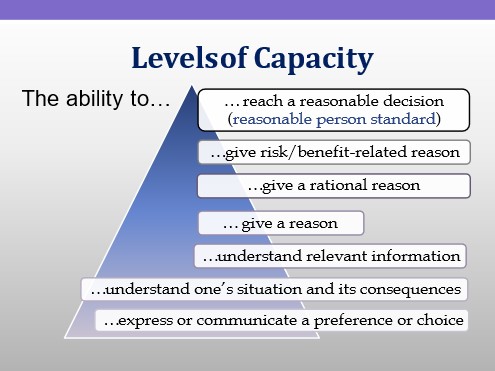Decision-Making Capacity
Decision-making capacity is a clinical determination that refers to whether a patient has the mental capability to:
- Understand relevant information,
- Appreciate the medical situation they are in and its possible consequences,
- Reason through risks, benefits and alternatives of treatment options, and
- Communicate a choice freely and voluntarily based on their own values.
Only adult patients with decision-making capacity are able to provide informed consent.
Capacity is NOT the same as Competence
Competence is a legal term that is used to indicate whether a person has the legal authority to make their own decisions related to their medical care, their finances and other personal choices. Judges are the only ones who can rule that a person is legally incompetent to make decisions for themselves and to appoint a guardian for decision-making.
Levels of Capacity
Decisions that are simple and low risk require less capacity. Higher levels of capacity are necessary for decisions that are complex and/or have potentially grave consequences.
Facts about Decision-Making Capacity
- All adults are presumed to have decision-making capacity, regardless of diagnosis.
- Decision-making capacity is decision specific.
- Capacity is affected by many factors–sleep, state of wellness or illness, medications, etc.
- Patients can have capacity some of the time, and either have limited capacity or no capacity at other times.
- Decision-making capacity also includes having the ability to engage in what a chosen decision requires.
- Adults with capacity have the right to accept or refuse medical intervention consistent with their goals and values.
- Health care practitioners are obligated to promote patients to make as many decisions as their capacity allows and to do so in the least restrictive manner possible.
Impaired Capacity and Refusals
- Concerns about a patient’s capacity are often triggered by unusual decisions or when patients are refusing recommended treatments that are low risk and high benefit.
- Concerns get stronger when the consequences of honoring an individual’s refusal:
- Are serious and far reaching, including imminent danger to self or others
- Include irreversible illness or loss of functional status
- Include preventable death.
- When patients have been deemed to lack capacity, we look to surrogate decision-makers–– their health care agent, guardian or person(s) who knows them best—for medical decisions.
- Patients who lack capacity and cannot provide informed consent retain the right to refuse medical recommendations and treatment.
